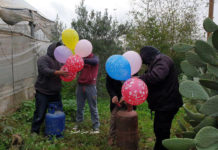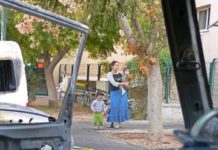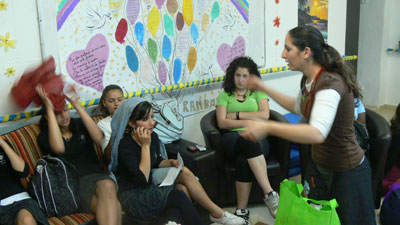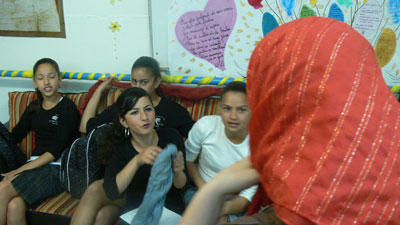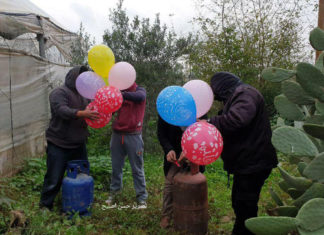Combining Drama and Treatment Therapy in Sderot
For the past few months, Sderot Media Center’s theater director, Livnat Shlessinger has been working with Sderot high school girls on the production of the play, Noar Sderot HaQassam, or Youth of the Qassam Way. Combining psychological therapy with theater, the Sderot girls are now gearing up for the final phase, conducting weekly rehearsals for the final production.
In order for the project to continue, the theater company is in need of immediate financial support. Livnat shares with us an overview of the play and the personal stories of the girls that helped create the play.
This play tells the story of a teenager girl called Shir, (Song in English) and the saga of her family who all live under the constant threat of rocket fire. Shir’s mother is continuously taking relaxation pills to deal with the stress and her father has conflict at his work. Shir herself has a dominant and ambitious nature and spends much of her time volunteering with Magen David Adom, much to the disapproval of her friend, Shnir.
The Sderot girls in a drama/therapy session in late May. (Photo:Jacob Shrybman)
The play reaches its climax when Shir receives a call from Magen David Adom to treat victims at the scene of a Qassam explosion in her city. Shir rushes to out to the scene with the ambulance crew only to discover that her friend Shnir is lying on the street in critical condition.
The play seeks to depict the tragedy of life under rocket attacks and the way in which teenage girls in Sderot manage life under the pressure of fear and uncertainty. The play often brings out the black humor and jokes which the girls share among themselves, along with the conflict and challenges that make up the reality of any Sderot teenage girl.
The girls who perform the play actually incorporated scenes from their everyday life into this unfolding drama. As a lifelong resident of Sderot and having experienced many rocket attacks myself, I incorporated my own personal story into the play as well–a memory of my younger brother last year.
My brother, who is 6 now, was born into the Qassam reality. He does not know anything else. Last year, during a particularly difficult time in a rocket escalation, my family and I left Sderot to go to Jerusalem. My little brother began to play outside and after a few minutes, he approached my mom and asked in surprise: “Mommy, when will there be a Tzeva Adom (Color Red alarm)? I am waiting but there is no Tzeva Adom yet.”
In the play, Yotam, Shir’s younger brother also asks her this question.
Another personal story featured in the play is that of one of the performers, Leora. There is a scene where Leora, who plays Shir’s father pounds on the door during the Tzeva Adom alarm, in fright. Leora told me in one one drama therapy session how she was home alone when the rocket alarm went off. “I was home alone and had no where to run because we had no shelter at the time. I was trembling in fear. I called my mom and started to cry. She came a few minutes later but that feeling of helplessness did not leave me.”
(Photo:Jacob Shrybman)
Rotem is another performer who decided to share and incorporate her own reaction to the rocket attacks in her personal life into the play. “I make use of laughter in order to deal with this rocket reality here,” says Rotem. “Many times after a Tzeva Adom, my friends and I will start to laugh. This reaction relaxes me and it helps me release the stress and fear.” Another performer, Esther agrees with Rotem. “I no longer get scared from rocket attacks–rockets have landed near my home a couple of times, but you get used to it and you learn to live with the fear by ignoring it.”
Many of the girls also receive psychological therapy to deal with the fear and rocket life in a healthier way. In the play, we therefore chose a scene which shows the psychological treatment that Shir and her family receive in order to gain an upperhand in dealing with the rockets.
The production of Noar Sderot HaQassam will launch in early August and the girls will perform across Israel before audiences which will include psychologists, educators and other professionals.
According to Sderot principal, Rabbi Eli Edri, “the play brings to light the raw emotions that are usually hidden and this in itself helped the girls to heal their pain in some way. I bless this project and wish good luck to Sderot Media Center on the initiative.” Indeed, the Sderot Community Therapy Treatment has helped the group of Sderot girls who participated in the project both in personal development and confidence in self-expression.
*Translated by Anav Silverman.



